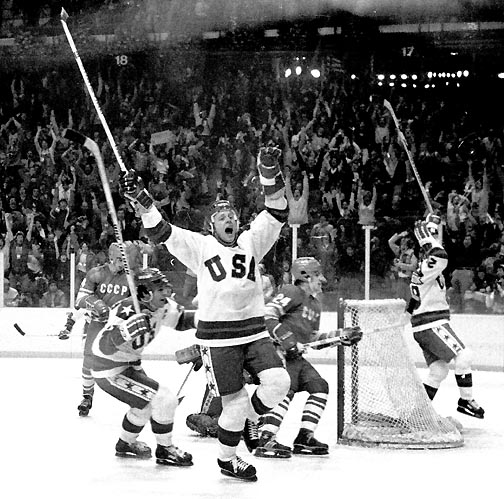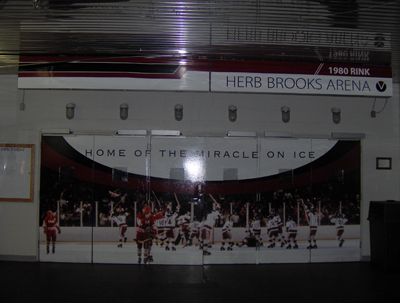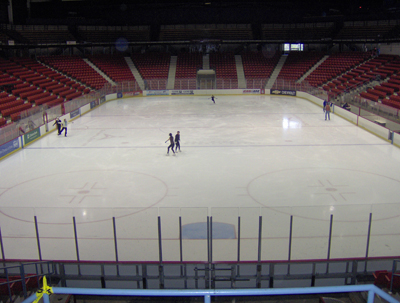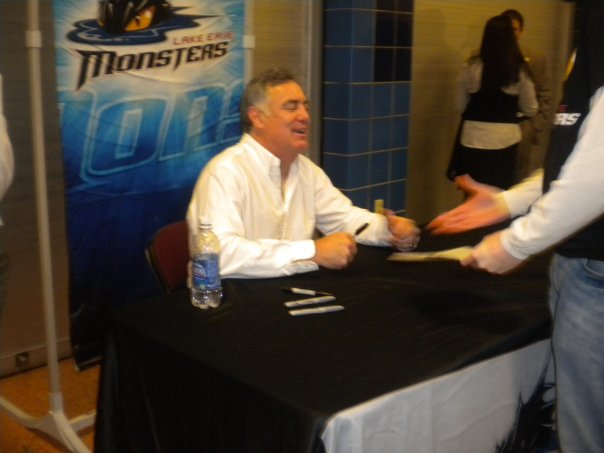 General
General  General Archive
General Archive  Reflecting on the Miraculous
Reflecting on the Miraculous
We had just done the impossible, and we were happy to be alive and thrilled to be Americans and thrilled to think that Herb (Brooks) was right; maybe we were meant to be here. It’s a feeling you wish everybody could have at one point in their lives.
meant to be here. It’s a feeling you wish everybody could have at one point in their lives.
Sometimes people ask me if I wish I could go back and do it again, if some part of me is sad that I will never experience that pinnacle again…You can’t dial up euphoria on demand.
Jim Craig wrote that in the foreword for Wayne Coffey’s “The Boys of Winter”, which in my opinion, is the best book written about the 1980 US Men’s Olympic Hockey Team. Euphoria is a powerful word in this context. One that somebody like me, a hockey player born in 1986, can only imagine.
There are generally two schools of thought to the February 22, 1980 Miracle on Ice. The first is mine- the perspective of a hockey player. Never once have I played on a big stage, except for being a fourth line center for my high school’s Red Southwest Division champion team. But, I am a red-blooded American hockey player, still plodding along through beer leagues and open hockey at the rink in Garfield Heights.
With all American-born hockey players, there is a brotherhood. There is a language exclusive to the sport. All of us, at one time or another, have endured a hellish penalty killing shift of taking frozen rubber pucks off the shin guards or the one shot that always seemed to find a vulnerable, barely padded spot. Most of us have gone through “Herbies”, as depicted in Miracle after the Norway game, at the early hours of the morning at practice. We have been hit into the unforgiving boards, felt the jubilation of scoring a goal, and been berated by a coach.
I cannot begin to express what the Miracle on Ice means to me, though my parents were not even together, nor was I even a thought, on that frigid night in Lake Placid, NY. Hell, I cried watching “Miracle” for the first time, let alone when I got to see the game replayed on ESPN Classic around 10 years ago. The emotion it takes to be a hockey player, coupled with having some semblance of an idea of what those kids went through can be an overwhelming feeling.
 On a family vacation in January 2007, I went to Lake Placid. Whether purposely preserving the site or no real desire to bring the little city in to present day, the place still appears set in the 1980s. I was absolutely stoked to enter Herb Brooks Arena, renamed to honor the late coach. When I entered, a figure skating practice was going on. Advertisements dotted the boards. The excitement, luster and allure I got walking past the countless 1980 hockey pictures and memorable player and team shots evaporated.
On a family vacation in January 2007, I went to Lake Placid. Whether purposely preserving the site or no real desire to bring the little city in to present day, the place still appears set in the 1980s. I was absolutely stoked to enter Herb Brooks Arena, renamed to honor the late coach. When I entered, a figure skating practice was going on. Advertisements dotted the boards. The excitement, luster and allure I got walking past the countless 1980 hockey pictures and memorable player and team shots evaporated.
I sat there, watching ten-year-old girls try double axles, looking at ads for local businesses, and it broke my heart. This 7700-seat arena was a place of reverence in my mind. Going to Lake Placid was like a pilgrimage to me. A place where I would come to honor the memory of historical figures and events. It, like so many people’s recollections and meanings of the events of this building, had been transformed. I looked around at the empty seats trying to imagine the fire marshals turning a blind eye to the over-capacity mob scene. I simply could not. It did not change my opinion of the accomplishment, nor did it belittle my emotions surrounding it, but it did, however, pour cold water on my hopes about visiting the arena.
As I sit here now, 31 years after the most historic event in sports history (in my opinion, so don’t shoot the messenger), I imagine how my life would have changed had this event not happened. If Mark Johnson had been half a second slower to getting to the loose puck that produced the game-tying goal at the end of the first period. If Jim Craig had made one less save. If Herb Brooks had taken Ralph Cox, the final player cut from the roster, over Olympic hero Mike Eruzione.
The USA Hockey network has been growing at an incredible rate since 1990-91. In 1990, the program had 195,000 participants. Now, it has over 475,000, including 100,000 under the age of eight. At the time of the Miracle, most players came from Michigan, Minnesota, and the northeast. Now, there are players all across the country. Given the external factors surrounding the 1980 Olympics, the growth of hockey 10 years after the games can best be explained by the effect it had on young people.
For many of the American-born players in the NHL during the 1990s, the Miracle on Ice would be their first real memory of hockey. As the generations progressed, so, too, did the number of young people playing hockey.
Aside from the hockey playing group like myself, there are the group of people who, as Al Michaels described them in the pre-game leading up to the show, “don’t know the difference between a blue line and a clothesline”. For this, I asked some of the writers here at TheClevelandFan.com to give me their thoughts on the Miracle.
Cris Sykes, aka pup: “What I can say is, without an appreciation for real time, the movie came as close as something could to making me feel that moment. Not sure what there is to take from that, but my appreciation certainly grew from watching the movie.
The meaning I take is pretty simple. Leadership. The vision of one man is all fine and dandy, but even the greatest of coaches cannot get it done until someone else believes. It showed to me, the most important goal for a coach to achieve is to find the right player to be the one to help deliver the message. A coach has the ability to lead an individual, but if he gets the right individual to follow him and become the type of leader the rest of the team can get behind, then anything can happen.”
Leadership. Herb Brooks was the ultimate leader. He had to take a group of kids who were rivals and turn them in to a team. They had individual talents, but the only way to win a tournament that you are an underdog in is to become a family. The guy on your left and the guy on your right need to be willing to get buried by the opposing player to give you a chance at a shot on goal. Then, not only that, Brooks had to get an impressionable, distraction-filled collection of immature college kids to believe in themselves enough to have a chance.
He succeeded. Brooks had enough foresight to schedule a game with the Russians three days before the Olympics were to start. The team, expectedly, got drilled 10-3. In Brooks’ eyes, there were enough pros to outweigh the cons of getting embarrassed. It brought the team back to a sense of reality. It gave him a chance to get a firsthand look at the Russians, the system that they played, and the matchups he wanted. Furthermore, it gave the Americans a shot at redemption. Say whatever you want about the decision, I call it genius.
Chris Hutchinson, aka hiko: “I remember it because it was one of the classic David vs. Goliath sports stories of all time, the fact that the evil Soviets were like machines on the ice, and we had to use a bunch of schlubs that weren't good enough to make the NHL. I think I was 7 when it happened, but I remember watching it on the TV in the basement where the fireplace (fire roaring) was in our old house, probably the first hockey game I'd ever watched.
So when we beat those Commie bastards, it was huge at the time. It was us vs. them, and this showed that even the mighty and terrible Russians were human after all. The Cold War was still in high gear in 1980.
That's what diminishes it for me, somewhat. The Cold War is long gone. Russia's just another country. I've also lost the 7 year old's perception of the world; the enemy is no longer a faceless mass of inhuman coldness. So while I still think of it as a great underdog triumph story, the national fervor that accompanied it is not there anymore (for me, at least). Now, it's just a nice sports story.”
My intention is not to pick on any of these guys, rather, show the differences between what the game means to a player and what it means to an outsider/casual observer of hockey. To hiko’s point about the “schlubs not good enough to play in the NHL”, that point is only somewhat correct. The Olympic Committee, at that time, did not allow professionals to participate in the Games. The Russians were as close to professionals as you could get. However, the United States team was completely made up of collegiate players. Two players from the team, Neal Broten and Mike Ramsay, had tremendous NHL careers. Jim Craig was never able to duplicate his superhuman performance and played in just 30 NHL games. Some of the others had moderate success, others had no success.
The Cold War is obviously over. The national fervor likely is gone. The world is in constant motion. Thirty-one years have passed since the game. In most circles, the game is simply viewed now as a sports achievement, an upset to be applauded, but probably no longer celebrated. There is nothing wrong with this viewpoint. While sad that it may be the reality for most people, the most vocal in the sports world would have been small children at the time of the Miracle. For them, it is something they barely remember or only know secondhand. It makes a difference in their interpretation.
Jesse Lamovsky, aka hermanfontenot: “I was about four-and-a-half years old when the United States defeated the Soviet Union in the 1980 Olympic ice hockey semifinal. At that age I was a lot more interested in watching “Super Friends” on Saturday morning than a hockey game on Friday night. So I have no personnel recollection of that night in Lake Placid.
Nor do I take much stock in the patriotic aspects of that game. It’s not that I don’t love my country- I do. I just don’t think anyone should need the result of a hockey match to love their country. No, the magic of that night is the magic of sports fan-hood: knowing that at any place, any time, you might see something so unexpected, so brilliant that you’ll remember it the rest of your life. You’ll remember where you were and what you were doing when you saw it.
It’s a feeling I’ve had many times as a fan, of Cleveland teams and otherwise. It’s a feeling I’m sure many people had as they were watching the United States take down the Soviets on that cold February evening in 1980. That’s why we watch. So just on the chance that one of those moments happen we can say, “I was there. I saw it.”
That, to me, is the real magic of that night.”
Jesse took the patriotism road, which many non-hockey fans take when looking back at the game. Unfortunately, he, like most of the TCF writers, was just a youngin’ at the time the game was played. However, I think his point is very legitimate that we watch sports on the off-chance that we see something amazing. Those who got to watch that game saw something amazing.
None of these viewpoints are wrong. And I am not saying that you need to be a hockey player to fully appreciate the Miracle on Ice, what it meant for our country, and what a monumental upset it was.
Quite simply, the purpose for writing this is to explore the numerous ways that the Miracle on Ice lives on. I still celebrate the events of February 22, 1980. I got to shake Jim Craig’s hand during his promotional appearance at the Lake Erie Monsters game on January 30, 2010. I watch the movie every year on February 22. When people ask me that question of, “Which three people, living or dead, would you want to have dinner with?”, I always include Herb Brooks.
shake Jim Craig’s hand during his promotional appearance at the Lake Erie Monsters game on January 30, 2010. I watch the movie every year on February 22. When people ask me that question of, “Which three people, living or dead, would you want to have dinner with?”, I always include Herb Brooks.
The Miracle on Ice gave me something that I can never return. It changed the perspective of the American hockey player and led to the growth of the sport. As a registered member of USA Hockey from being an official, it is the least I can do to honor the members of that team, coaching staff, and the people in Colorado Springs at USA Hockey who gave Herb Brooks the chance to coach the team.
As sports fans, it gave us all something. The realization that on any given night, anything can happen. So many of us use sports as a distraction in our daily lives. Without faith in our teams, there would be no point. If a team of college kids can beat a team of hardened professionals who have been together for 15 years…well, miracles can happen in sports.
- NBA Announces 2013-2014 Schedule
- Browns Ink Sharknado
- Sharknado A No-Show For Rookie Camp
- Trent Richardson Out Until Training Camp
- Browns Sign Brandon Jackson
- Carrasco Suspended Eight Games
- Browns Add to Wide Receiver Depth with David Nelson
- Browns Need to Learn from Past Draft Mistakes
- Browns Release Chris Gocong and Usama Young
- Browns Missing on Grimes Disappointing, But Not The End
The TCF Forums
- Movies coming out
rebelwithoutaclue (Tuesday, January 21 2014 12:56 PM) - 2015 Recruiting
jclvd_23 (Tuesday, January 21 2014 12:38 PM) - The 2014 Offseason Thread
Larvell Blanks (Tuesday, January 21 2014 12:25 PM) - Official- Browns Coach Search/Rumors
Larvell Blanks (Tuesday, January 21 2014 11:53 AM) - Chris Grant's first 3 drafts
Kingpin74 (Tuesday, January 21 2014 10:13 AM) - Mike Brown
YahooFanChicago (Monday, January 20 2014 11:15 PM) - 2014 Hoops Hockey Hijinx
jpd1224 (Monday, January 20 2014 4:44 PM) - 2014 Recruiting
jclvd_23 (Monday, January 20 2014 2:26 PM) - Wish List - #4 Pick
Hikohadon (Monday, January 20 2014 1:26 PM) - #1 overall pick Anthony Bennett
TouchEmAllTime (Sunday, January 19 2014 1:28 PM)


